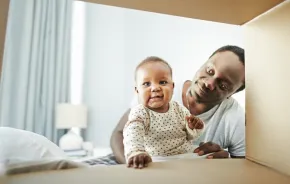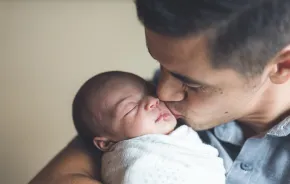 Know this feeling? You buy that big-ticket item that you know you need for your baby's nursery, only to watch it collect dust in the corner. These days, fewer of us have the luxury of buying unnecessary things, and a more conservative approach to preparing for baby is better for the planet, too. So why not cast a critical eye on those nursery purchases? What do you really need? And are there cheaper ways to get it?
Know this feeling? You buy that big-ticket item that you know you need for your baby's nursery, only to watch it collect dust in the corner. These days, fewer of us have the luxury of buying unnecessary things, and a more conservative approach to preparing for baby is better for the planet, too. So why not cast a critical eye on those nursery purchases? What do you really need? And are there cheaper ways to get it?
Frugal and earth-friendly
A host of nursery products claiming to be eco-friendly shock the pocketbook, but considering the environmental consequences of your parenting choices need not be expensive. When it comes to baby clothes and toys, you may never have to buy anything new. Between thrift and consignment stores, eBay and Craigslist, you can handle most of your baby’s nursery needs. With a little creativity, you can coordinate a kids’ clothing and toy swap in your community, and find ways to keep recycling your child’s old clothes while collecting new things that will fit as she grows. Thrift stores are often brimming with old books, and don’t forget that there are free books just waiting for you at your local library.
Used first-year baby items are generally in great shape, because infants outgrow them before they wear them out. When your baby's nursery items begin a second life in your home, you should refer to the Consumer Product Safety Commission’s website for recall notices to confirm that none of your purchases have been recalled.
Maybe you don’t need in the nursery . . .
When you do make that long list of things you need in the nursery, consider these essential areas in which you can save money.
Diapers
A hundred years ago, no one used disposable diapers. In fact, some cultures still don’t use diapers at all. Consider options like elimination communication (think: diaper-free baby), diaper services and cloth diapers. All of these options cost considerably less than the cost of disposal diapers, keep vast amounts of trash out of the landfill and have the added benefit of encouraging earlier potty learning.
Strollers
Strollers are usually superfluous with newborn babies, who don’t weigh very much and who prefer to be held closely. While a stroller is a convenient option for a toddler, it is a totally avoidable expense if you are willing to consider “wearing” your baby, which also has infant health benefits. “Temperature maintenance, heart rate and breathing regulation all improve when parents carry babies in a baby carrier,” says Dr. Jeff Ernst, a pediatrician at Richmond Pediatrics in Shoreline. And, Dr. Ernst adds, wearing a baby increases bonding and boosts baby’s motor development.
Cribs
Nursery cribs are a uniquely Western and fairly modern invention. Many, many millions of human babies have lived without them, and yours can as well. Rather than investing hundreds of dollars in a crib and special crib bedding in your nursery, you can choose to use a co-sleeper or a mattress on the floor, or to sleep with your baby in a safe adult bed.
James J. McKenna, Ph.D., director of the Mother-Baby Behavioral Sleep Lab at the University of Notre Dame, says advantages of co-sleeping can include less crying, better sleep and closer attachment. Of course, safe co-sleeping guidelines should be followed every time anyone sleeps with a baby.
Baby videos
The American Academy of Pediatrics recommends that children younger than the age of 2 avoid television entirely.
 Fancy clothes and linens
Fancy clothes and linens
While extremely cute, babies are messy little people. Save the fancy clothes for when they are old enough to appreciate them and care for them. Likewise with infant bath towels; babies can easily be dried with the towels you already use. The American Academy of Pediatrics recommends that you skip crib bumpers, which are associated with an increased risk of suffocation.
Special foods
“Thinking that babies need special food is a myth,” says Cynthia Lair, local author of Feeding the Whole Family and nutrition faculty member at Bastyr University. Rather than getting tiny jars of processed food, Lair says, we are better off serving our babies something fresh from our own plate.
With all of these tips, you can save your money for the nursery essentials, which can be hard to find used, such as a safe infant car seat, nutritious foods, preventive health care or a college fund.
Tera Schreiber is the former executive director of Great Starts Birth & Family Education as well as the mother of three children, who taught her much about what she did not need to buy for their baby days.











